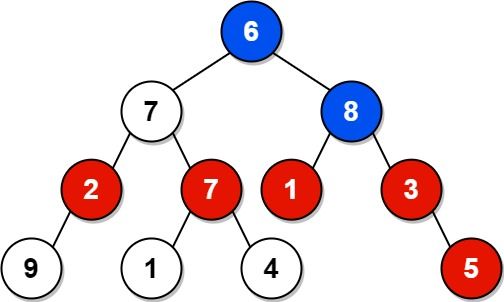Welcome to Subscribe On Youtube
1315. Sum of Nodes with Even-Valued Grandparent
Description
Given the root of a binary tree, return the sum of values of nodes with an even-valued grandparent. If there are no nodes with an even-valued grandparent, return 0.
A grandparent of a node is the parent of its parent if it exists.
Example 1:

Input: root = [6,7,8,2,7,1,3,9,null,1,4,null,null,null,5] Output: 18 Explanation: The red nodes are the nodes with even-value grandparent while the blue nodes are the even-value grandparents.
Example 2:

Input: root = [1] Output: 0
Constraints:
- The number of nodes in the tree is in the range
[1, 104]. 1 <= Node.val <= 100
Solutions
DFS.
-
/** * Definition for a binary tree node. * public class TreeNode { * int val; * TreeNode left; * TreeNode right; * TreeNode() {} * TreeNode(int val) { this.val = val; } * TreeNode(int val, TreeNode left, TreeNode right) { * this.val = val; * this.left = left; * this.right = right; * } * } */ class Solution { private int res; public int sumEvenGrandparent(TreeNode root) { res = 0; dfs(root, root.left); dfs(root, root.right); return res; } private void dfs(TreeNode g, TreeNode p) { if (p == null) { return; } if (g.val % 2 == 0) { if (p.left != null) { res += p.left.val; } if (p.right != null) { res += p.right.val; } } dfs(p, p.left); dfs(p, p.right); } } -
/** * Definition for a binary tree node. * struct TreeNode { * int val; * TreeNode *left; * TreeNode *right; * TreeNode() : val(0), left(nullptr), right(nullptr) {} * TreeNode(int x) : val(x), left(nullptr), right(nullptr) {} * TreeNode(int x, TreeNode *left, TreeNode *right) : val(x), left(left), right(right) {} * }; */ class Solution { public: int res; int sumEvenGrandparent(TreeNode* root) { res = 0; dfs(root, root->left); dfs(root, root->right); return res; } void dfs(TreeNode* g, TreeNode* p) { if (!p) return; if (g->val % 2 == 0) { if (p->left) res += p->left->val; if (p->right) res += p->right->val; } dfs(p, p->left); dfs(p, p->right); } }; -
# Definition for a binary tree node. # class TreeNode: # def __init__(self, val=0, left=None, right=None): # self.val = val # self.left = left # self.right = right class Solution: def sumEvenGrandparent(self, root: TreeNode) -> int: self.res = 0 def dfs(g, p): if p is None: return if g.val % 2 == 0: if p.left: self.res += p.left.val if p.right: self.res += p.right.val dfs(p, p.left) dfs(p, p.right) dfs(root, root.left) dfs(root, root.right) return self.res -
/** * Definition for a binary tree node. * type TreeNode struct { * Val int * Left *TreeNode * Right *TreeNode * } */ var res int func sumEvenGrandparent(root *TreeNode) int { res = 0 dfs(root, root.Left) dfs(root, root.Right) return res } func dfs(g, p *TreeNode) { if p == nil { return } if g.Val%2 == 0 { if p.Left != nil { res += p.Left.Val } if p.Right != nil { res += p.Right.Val } } dfs(p, p.Left) dfs(p, p.Right) } -
/** * Definition for a binary tree node. * class TreeNode { * val: number * left: TreeNode | null * right: TreeNode | null * constructor(val?: number, left?: TreeNode | null, right?: TreeNode | null) { * this.val = (val===undefined ? 0 : val) * this.left = (left===undefined ? null : left) * this.right = (right===undefined ? null : right) * } * } */ function sumEvenGrandparent(root: TreeNode | null): number { const dfs = (root: TreeNode | null, x: number): number => { if (!root) { return 0; } const { val, left, right } = root; let ans = dfs(left, val) + dfs(right, val); if (x % 2 === 0) { ans += left?.val ?? 0; ans += right?.val ?? 0; } return ans; }; return dfs(root, 1); }